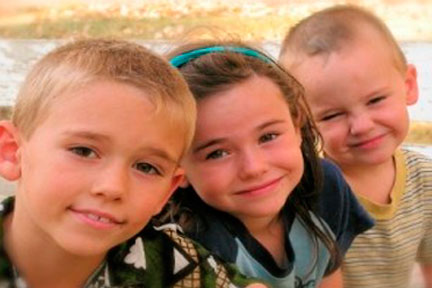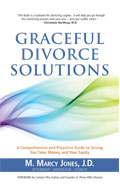
By M. Marcy Jones
As a lawyer, mediator and coach, I cannot emphasize strongly enough how important it is for the well-being of your children that you and your spouse find ways to deal with your conflict without becoming enmeshed in a legal battle during the divorce process. The truth about divorce and children is that your children’s present and future emotional health is at stake. As difficult as it may be when you are going through this tumultuous time yourself, you have to focus on what’s best for your children.
Study after study shows that children do best when their parents are able to set aside their disagreements (at least in their presence) and focus on what’s best for them. The truth about children and divorce is that children do well when both parents remain committed to their welfare. Conversely, they don’t do well when their parents are not committed to their welfare.
Here’s the problem I run into in case after case regarding divorce and children: both parents say they are committed to the welfare of their children, and both parents say they want what’s best for their children. But then I see one or both of them saying things and doing things that are completely contrary to what is best for their kids.
These may be things that put the children squarely in the middle, like “I know this is your night to be with your dad, but I’m inviting the neighbors over for a cookout. Wouldn’t you like to stay here so you can swim and play with the other children?” Or things that might make the children feel bad or feel sorry for the parent, like the parent crying and saying, “I miss you so much when you aren’t here.” This puts the children in the role of being emotional caretakers for their parents, and it definitely is not good for children to have this burden.
Dr. Constance Ahrons, a specialist in divorce and children and author of We’re Still Family, says there are two critical factors that determine how your divorce will affect your children.
1. Get along with the other parent as much as possible. Getting along means making a true effort to support the other parent in his or her relationship with the children and to be cooperative as needed for the sake of the children.
2. When conflicts do arise, keep the children out of them. Children don’t need to know the details of your situation. They don’t need to know about other relationships, or money, or who did what to whom. What they need to know for sure is that both of you are there for them 100 percent, despite what’s going on around them. Of course they will be sad about the divorce, but keeping them out of the fray will protect them psychologically and emotionally.
Dr. Ahrons says, “These two factors differentiate between the children who are and are not damaged by divorce.” The good news in her statement is that your children do not have to be damaged by the divorce process. It is possible to divorce and still raise children who are healthy, well-adjusted, balanced, and happy.
Here’s how: do everything within your power to avoid high conflict between you and your spouse, angry outbursts in front of your children, and taking positions and engaging in power struggles with your spouse.
Instead, do everything in your power to remind yourself (as often as necessary) that your children need you and your spouse to work together to make decisions that are good for them. Be open to receiving information about what is best for your children so you and your spouse can make good decisions about them, rather than locking into a position about what you may think is best. And finally, remember that you, not your children, are getting the divorce. While the divorce process will change the form of your family, it doesn’t need to, and shouldn’t, change the way the children think and feel about each parent. Remember, the marital relationship may be ending, but the parenting relationship continues for as long as you live.
It may be helpful to get a counselor involved to meet with you and your children to ensure they are adjusting to the changes as well and as normally as possible. Counselors can be the best resource for parents during this time. They can offer insightful information about what is and is not working for the children. Their only agenda is to help your kids adjust to the changes and move through this difficult time in an emotionally healthy manner. Children usually enjoy this new relationship. The counseling sessions are a safe place for them to talk about what’s going on, how they’re feeling, and to learn some valuable coping skills.








